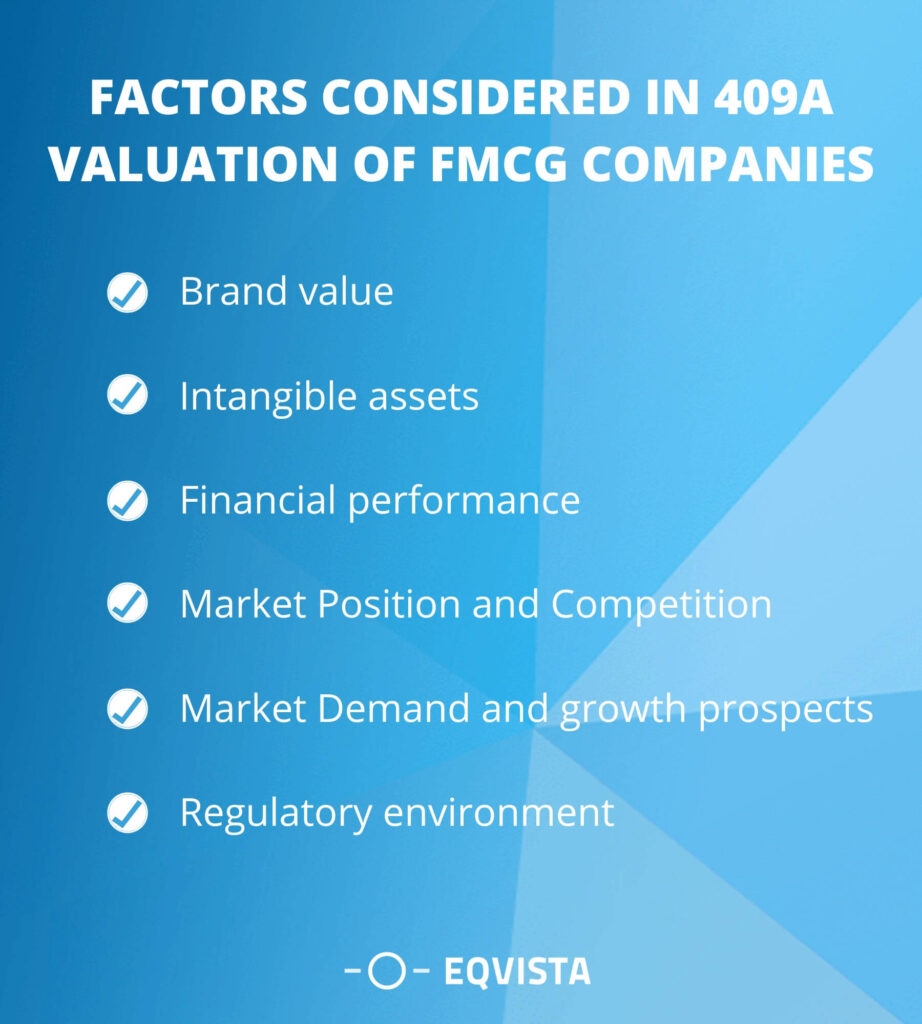409a Valuation for FMCG Companies
This article is aimed at helping you understand the importance of 409a valuation for FMCG companies and how to conduct an accurate valuation.
A fast-moving consumer goods business’s field sales specialists are the face of the brand and the voice of retailers, making them important in expanding the company’s reach. At the same time as they’re providing vital information to retailers about the goods, they’re also relaying information to FMCG management about POS issues that affect customer influence.
The fast-moving consumer goods sector is an alluring market due to its consistent demand throughout the business cycle. Companies in the fast-moving consumer goods industry (FMCG) can maintain steady earnings and profit levels by gradually passing on hikes in input prices to consumers.
But when it comes to analyzing their worth, there are a few factors considered in the 409a valuation of FMCG companies. This article is aimed at helping you understand the importance of 409a valuation for FMCG companies and how to conduct an accurate valuation.
409a valuation and FMCG companies
Salaries are often the single largest expense for a business. However, it is undeniable that capital is necessary to acquire the top individuals that can grow their startups into successful FMCG companies.
To recruit and keep talented staff, it has become more usual for startups to provide them with shares. While it’s clearer for a publicly traded company, it might be difficult for a private company to assess its value and determine how many shares it can afford to give to workers. This is when the section 409A valuation comes into play.
A brief overview of 409a valuation
The 409A valuation is an estimate of the value of the common shares in your startup company. Whereas the share price of a publicly listed firm may be seen by everyone, an independent valuation of a private company’s shares is required to determine its true value. Two primary situations need a 409a valuation:
- In the early stages of stock option planning
- When a significant event occurs in your firm
Importance of 409a valuation for FMCG companies
A 409a valuation safeguards a business in several ways. The most important considerations for FMCG companies planning to conduct a 409a valuation would be either or all of the following.
- Ensures that the price of your options will be at the Fair Market Value at all times.
- Defends your workers against any potential issues that may arise from their options becoming profitable.
- Offers protection against the possibility of audit scrutiny if your valuation is being examined by an auditor.
Understanding FMCG Companies
Products that are high in demand yet cheap in price fall under the category of fast-moving consumer goods. Consumer packaged goods (CPG) is another term for these items. Whether it’s due to their perishable nature (as with meat, dairy, and baked goods) or strong customer demand, FMCGs have a limited amount of time before they must be consumed. These items are high-turnover sellers because of their cheap prices, high volume of purchases, and short shelf lives. In addition, they sell quickly off the shelf.
Products aimed at the typical customer are known as “consumer goods”. You may classify them as either durable goods, nondurable goods, or services. Nondurable items often expire in less than a year, whereas durable ones typically last for three years or more. The consumer products market is dominated by fast-moving consumer items.
Types of FMCG Companies
As has been stated before, fast-moving consumer products are items that are either nondurable or products that have a limited lifetime and are used at a rapid rate. Fast-Moving Consumer Goods (FMCGs) may be broken down into a few distinct groups, namely:
- Items that have been processed such as cheese, cereal, and boxed pasta
- Hot and ready meals
- Water bottles, energy drinks, and fruit juices.
- Pastries such as doughnuts, bagels, and cookies
- Items from the refrigerator, freezer, and pantry like carrots and frozen peas
- Medicines, including over-the-counter options like aspirin and painkillers
- Cleaning supplies such as baking soda, oven spray, and window/glass cleaning
- Toiletries and other beauty aids including shampoo, conditioner, concealer, and soap
- Markers, pencils, and other utensils for the office
Factors considered in 409a valuation of FMCG companies
To arrive at a meaningful estimate of fair market value, the valuation process includes an in-depth investigation of the company’s finances, customer base, growth potential, intangible assets, and other elements.

- Brand value – To reduce the risk, or even the perception of risk, your firm faces, it is prudent to diversify your product range rather than depending too much on any one supplier. It is more probable that investors would assign a high value to a company that has competent managers in charge of its marketing and sales, accounting and finance, design, and production.
- Intangible assets – The actual worth of intangible assets will represent the expectations of market players at the time of purchase on the likelihood that the projected future economic benefits inherent in the asset would flow to the company.
- Financial Performance – Profits and Gains Potential buyers of small companies put greater emphasis on learning the company’s cash flow cycle. Small companies that have a history of beating the market average sometimes get an EBITDA multiple premia over the current market average.
- Market Position and Competition – When deciding whether or not to invest in, acquire or sell a business, it is essential to factor in the value of the company’s competitive advantages. This might also be helpful if the evaluation is being conducted to sell assets or intellectual property that provide a competitive advantage. A company’s advantage over its rivals may stem, for instance, from its location in a high-traffic retail zone.
- Market Demand and growth prospects – Investors and buyers care about a company’s growth prospects, but these projections have little bearing on the company’s current tax bill or the worth of its assets on the public market.
- Regulatory environment – The legal and regulatory principles play a major role in 409a valuation. The evolving regulations and policies demand founders and investors be updated on the policies regularly. Non-compliance causes severe consequences.
Key challenges in conducting 409a valuation for FMCG companies
Due to increased competition and the widespread use of new technologies, FMCG firms must provide their field sales employees with the tools they need to provide customers with accurate and timely information. The inability to do so may result in challenges with expanding market coverage effectively, such as:
- Lack of comparable companies – What makes the service supplied stand out in comparison to similar options is the relative value. A survey of 155 brands found that when service was below average, products performed at 81% of their typical level, but when service was better than average, products performed at 1.2 times their typical level. Field salespeople must advise customers about market competitors’ strategies.
- Difficulty in valuing intangible assets – Valuing intangible assets, which are often intellectual property, may be tricky because of the unpredictability of their future earnings. Intangible assets are those that a firm does not physically own but that contribute to its value or worth in the long run.
- Changing market conditions and customer behavior – The fast-moving consumer goods sector is seeing a sustained shift in consumer behavior as a result of people becoming more technologically enabled. Just being able to sell something convincingly isn’t enough. Leaders in the fast-moving consumer goods (FMCG) industry need to be able to understand the current selling environment and foresee the next trend so that key choices may be made in good time.
- Regulatory uncertainty – FMCG firms can’t expect to succeed in the market without providing excellent service to the appropriate outlets at the right time. It’s crucial to position the correct items in the proper places to boost sales. The FMCG management team must improve their decision-making skills to strategically choose retail locations and maintain adequate inventory levels.
Best practices for ensuring compliance and accuracy in 409a valuation
It is crucial to keep the following things in mind before gearing up for a valuation study. This also ensures you are compliant with the necessary regulations.
- Include your most current pitch deck, business strategy, or executive summary, as well as your board presentation if you have recently finished a fundraising campaign.
- The number of options you expect to issue in the following calendar year is another number you’ll need to estimate. An easy way to estimate this is to multiply the total from your recruiting strategy by the typical number of choices each employee has. Make sure you account for projected executive hiring budgets.
- Communicate your timeline estimates for any major developments after the previous 409A valuation, such as an initial public offering or merger and acquisition. When submitting a 409A valuation for the first time, it is important to provide a full history of all relevant events.
- The valuation date and the following two calendar years’ worth of projected revenue and EBITDA should be included in your financial statements. Remember to include your cash flow and debt estimates for the next three years. Due to a lack of experience, new businesses should only strive for this level of accuracy.
How valuation is done for an FMCG company?
The valuation of FMCG companies is done considering the following factors in mind:
- Quantifying the Worth of Assets based on the value of cash flows at a future date
- The prices at which similar companies (public and private) are selling
- Considerations beyond only marketability and control premiums
- What additional uses the company has for the valuation technique
In other words, the precise control and liquidity features of the subject interest, as well as the market, income and cost approaches, should all be taken into account for an accurate value. The IRS is especially concerned that the value placed on common stock for Section 409A purposes does not differ from values made for other reasons.
Get a 409a valuation for your FMCG company from Eqvista!
The FMV of the underlying shares on the grant date is readily ascertainable for publicly traded corporations. If you want to know what a private company is worth, you can’t just pick up a finance journal and look it up. To do this, you need to use a third-party appraiser. Eqvista is a top supplier of 409A values, so you can get your business evaluated here. The 409a valuations we provide are tailor-made to fit your company’s specifics and come complete with detailed charts and tables. If you want to talk about your case, just give us a call right now!
Interested in issuing & managing shares?
If you want to start issuing and managing shares, Try out our Eqvista App, it is free and all online!
